First Hand Account – after Peleliu
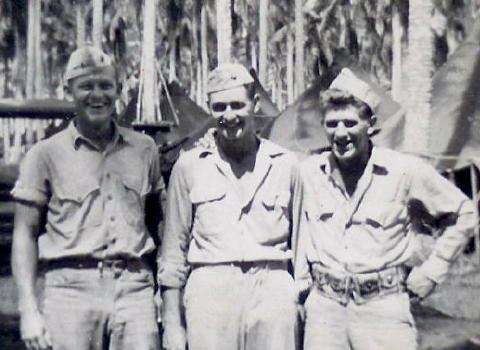
Bruce Watkins (Commander), Monty Montgomery (platoon Sgt.) & Steve Stasiak (guide)
INTRODUCTION: The following is a chapter taken from “Brothers in Battle” by R. Bruce Watkins. This book was written for the benefit of his children, grandchildren, and friends who have an interest in the events of World War II as he saw them. It reflects his personal experience as a platoon leader in E CO/ 2ND Battalion/1st Marines at Peleliu. He also served as company commander of E Co on Okinawa. Bruce dedicated his book to “My Brothers, those undaunted Marines, who followed me without hesitation into the very jaws of death.” [Pictures below are some of these men.]
We don’t often hear what happens after the men fight, the following is what Bruce Watkins remembered after the battle:
Chapter V
PAVUVU
As we filed off the Tryon to our old bivouac at Pavuvu, we saw few familiar faces. There were a handful of lightly wounded casualties, but all the other living were still hospitalized. Settling into the tents that had been our home a short month ago, we were immediately struck by the empty cots with personal gear stowed below. We had returned with about 15% of our original number. That made for a lot of empty cots. Most of these cots would never see their original occupants again.
Shortly after, I received a summons from Division headquarters. “We think we may have one of your men down here.” It was PFC Brennan and he told me he did not have a name, that the Japs had taken it from him on the second day. He was sent home to the States and I received a letter from him some time later. He had been suffering from cerebral malaria but back in a cool climate he had recovered.
In the heat of the Peleliu battle I had not accounted for two of our 17-year-old privates, but these returned to us now, unscathed. Monty told me they had bugged out in the middle of the battle. I had assumed they were wounded or killed. Although this was technically desertion under fire, the NCO’s had a great deal of understanding, taking into account their youthfulness. I saw no reason to take issue with their judgement, and these two more than proved themselves in the next battle.
There were many signs of strain after Peleliu. Our colonel told us how coming out of the shower he met a major, a member of Battalion Staff, with a towel draped over his arm. The major asked the colonel if he really liked him. The colonel replied, “Of course.” He then removed the towel displaying a loaded 45 pistol in his hands. “I’m glad you do,” he said, “because if you didn’t, I would have to shoot you.” Our colonel made quiet arrangements and the major was shipped back to the states under guard.
We took a boat over to Bonika, the main island of the Russells, where our hospital was. There we saw many of our comrades. John Kincaid was having trouble with both eyes and Joe Gayle was just getting the use of his arms back. Sam Alick was recovering well from the leg wound, but his thumb would never work the same. Another platoon sergeant, a handsome man, had half his face and jaw gone. A gunny sergeant with a shattered pelvis lay there with rods like an erector set holding his hips in place, and so it went. The good news was that Lee Height could return with us.
Back on Pavuvu in the days that followed, we were allowed to rest and routine was at a minimum. We drifted from tent to tent checking on who had returned and always there were the empty cots. This was a most necessary rehabilitation period during wich we dealt with our shock and the loss of many friends. We were to need that rest both physically and mentally for there was much ahead of us.
In 1992 Bruce wrote “Brothers in Battle” about his experiences. The period covered stretches from December 1941 until November 1945.
#####################################################################################
Military Humor –

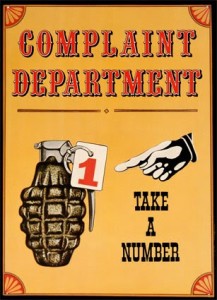 #####################################################################################
#####################################################################################
Farewell Salutes –
Edward Borschel Jr. – Panama City, FL; US Army, 187th RCT
Jack Griffiths – San Diego, CA; US Army, Korea, HQ/38/2nd Infantry Div., Major, POW, KIA
Dixie Heron – UK; RAF, WWII, ETO, 249th Squadron
Hugo Koski – Mt. Vernon, NY; US Coast Guard, WWII, Quartermaster
Ira Miss Jr. – Frederick, MD; Korea, HQ/38/2nd Infantry Div., MSgt., POW, KIA
Clifford Nelson – Spanish Fort, AL; US Navy, WWII, PTO & Korea, Captain (Ret. 29 years)
Charles Owen – Greendale, WI; US Navy, WWII
Lee Ragatz Jr. – Dania, FL; US Navy, USS Midway
Jack Slaughter (103) – Muskogee, OK; US Navy, WWII, PTO, USS Welles, Silver Star
Martin Waddington – So.Hurtsville, AUS; RA Air Force # NX098714, 10th Squadron
######################################################################################
Posted on February 16, 2017, in First-hand Accounts, WWII and tagged 1940's, History, Marines, Military History, Pacific, Pacific War, Peleliu, veterans, war, WW2, WWII. Bookmark the permalink. 83 Comments.


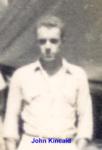
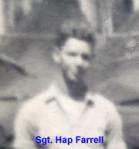
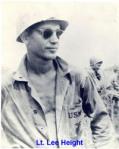







I have a copy of Brothers in battle and have read it many times…the author sent it with his regards to my grandfather…who served with him…he is pictured above in the first photo….Arthur “Steve” Stasiak. He would be wounded severely on Pelelieu on the first day of the invasion…September 15th. Nostalgia brought me back to the site to peruse and ponder what they went through during those trying times in hell.
LikeLiked by 1 person
I am so happy to hear from you! You help bring the book to life knowing that these men were real, they did fight and deserve to be remembered!
Thank you very much for commenting here, Julian.
LikeLike
It was so hard to read this sad things.War stop for us people when we are free again.But to victims of war..I think they never lost all the bad things and pain..It leaves in theirmemory
LikeLiked by 1 person
You are quite right, Mary Lou.
LikeLike
What a solemn quiet thoughtful read.
LikeLiked by 1 person
Thank you very much for coming back to read it.
LikeLike
I enjoy all your posts gp, they really bring moments to life, this story more so, it cuts straight to the bone in illustrating the very basics of the soldiers routine after the conflict is over, the mental stress would have started it’s long journey in their minds for the rest of their lives.
LikeLiked by 1 person
After reading this, I realized that I have never had a post that deals with immediately after battle. I agree that it brings the realization of what happened into focus.Your first-hand experience is appreciated.
LikeLiked by 1 person
What a gift! Now his story (in his own words) will flow forward through the generations. Thanks for sharing it 🙂
LikeLiked by 1 person
I very glad you found it interesting, Lady G. Have an outstanding weekend!
LikeLiked by 1 person
You too my friend 🙂
LikeLiked by 1 person
🙂
LikeLiked by 1 person
Quite a moving first account, GP.
After Dad retired, he used to take coconut shells and mount them on some kind of base. They were carved and painted and a clothes pin glued on top so they could be used to hold papers, notes, etc. All had labels made with a hand-held plastic tape labeling machine. I remember one of them in particular named “Pavuvu”. On top of the clothes pin he had glued an acorn via its flat side, and moved he cup to the pointed end. On that acorn he painted a Japanese face. I am understanding more and more about him and what he experienced as I read these posts.
LikeLiked by 1 person
I am happy to think that in some small way I helped you become closer to your father. When weary Marines arrived on shore of Pavuvu in May of 1944, those promises of a paradise R & R were shattered by reality. Pavavu was a massive coconut grove…a massive, untended coconut grove. Coconuts weren’t harvested there, they simply fell to the ground and rotted. They were everywhere, and in places they were 2 or 3 feet deep. Imagine if you can, the pleasant aroma of an entire island covered with smell of rotting coconut milk. It’s what greeted the arriving Marines.
I hope you have a wonderful week ahead of yourselves.
LikeLiked by 1 person
Excellent post that vividly describes the after effects of that form of hell known as combat.
LikeLiked by 2 people
Now – if only we could convince the politicians!!
LikeLiked by 2 people
Very few can return from something like this unaffected – physically or emotionally. My own father never spoke about combat. Only the good things – such as they were.
LikeLiked by 1 person
My father was the same.
LikeLike
The sad fact of war that is never written about, thank you so much for sharing this with us.
LikeLiked by 2 people
Hopefully people will one day learn to stay out of a state of war. Thanks for dropping by, Terry.
LikeLiked by 1 person
This is quite painful to read!
LikeLiked by 1 person
So many of the stories are at that, Hilary. It makes me appreciate you reading all the more. Thank you.
LikeLiked by 1 person
Reblogged this on Ancien Hippie.
LikeLiked by 1 person
Thank you so much, Penny for carrying this story.
LikeLike
Another fine and important read about the extraordinary cost of war. To think this is just one battle these men would endure.
LikeLiked by 1 person
Very true, Lloyd. So many only think about two or three battles when the Pacific is mentioned. The territory these men covered was incredible!
LikeLiked by 2 people
Such a poignant post, GP
LikeLike
Thank you, Derrick.
[sorry for the late response – somehow, you ended up in the Spam file!]
LikeLiked by 1 person
That happens a lot, GP
LikeLiked by 1 person
To you? I rarely have a reader in there, but it does occasionally happen on my regular email spam folder as well – every once in a while.
LikeLiked by 1 person
Occasionally, really
LikeLike
GP, very disturbing to read this account. The visual of “empty cots” so very sad. I know war has its horrors, however reading personal accounts makes it even more horrific. Thank you for bringing these kinds of stories to us, honoring those who bravely serviced. Christine
LikeLiked by 1 person
I know they’re hard to read and I appreciate you going through each one. Thank you.
LikeLiked by 1 person
Another dark side to war..
LikeLiked by 2 people
The main reason to stay out of one.
LikeLike
Sounds like a good plan..
LikeLiked by 1 person
Thanks, GP
LikeLiked by 3 people
A very harrowing experience indeed.
LikeLiked by 3 people
So true.
LikeLiked by 1 person
Heart wrenching. ~~dru~~
LikeLiked by 3 people
I know it’s difficult to discuss, but after what they went through, they deserve to have us know about it and remember. Thank you for visiting here today.
LikeLiked by 1 person
I SO agree with that thought, GP. If we are going to continue to send our “boys” (and “girls”) to war, we owe them the respect of realizing what we have been sending them to attempt to do, *especially* when it is difficult to think about or to read. Thanks for this important post, although It was indeed difficult to read.
xx,
mgh
(Madelyn Griffith-Haynie – ADDandSoMuchMORE dot com)
ADD Coach Training Field founder; ADD Coaching co-founder
“It takes a village to transform a world!”
LikeLiked by 1 person
Wow – this is the story we NEVER hear. It really adds a different human dimension to the war.
LikeLiked by 3 people
Isn’t that the truth?!! Every eye witness account gives us a better perspective.
LikeLiked by 2 people
I am going to add this book to my reading list.
LikeLiked by 3 people
I believe you’ll find it very interesting. Also….
http://www.brucewatkinscenter.com/
LikeLiked by 1 person
I’m seriously thinking of picking up a copy for myself. This is really interesting and a great primary source for WWII history.
LikeLiked by 3 people
Most certainly is, Susan. I doubt you’ll be disappointed! In the meantime…
http://www.brucewatkinscenter.com/
LikeLike
Reading this was hard enough, I cannot imagine what these men lived through. Thank you for always sharing them.
LikeLiked by 3 people
It’s my way of saying Thank You to them, so I appreciate your reading it.
LikeLiked by 1 person
Your thank you’s are amazing.
LikeLiked by 1 person
🙂
LikeLiked by 1 person
The aftermath of battle is so harrowing to read about but should be read more!
LikeLiked by 3 people
It should be!! Especially since there is such renewed interest.
LikeLiked by 1 person
[PS. I have The House on Tenafly Road, but have not been able to get to it just yet. My apologies.]
LikeLike
🙂
LikeLike
Had to dig into WIkipedia since the term battalion varies so much in number. About “returning with about 15% of their original number” Under USMC – A battalion usually contains two to five organic companies (batteries in the artillery), with a total of 500 to 1,200 marines in the battalion. So they returned with between 75 to 180 men.
One of many reasons I have zero tolerance toward liberal idiots attitude on immigration. Particularly the 9th circuit court; they need a refresher course on the cost of freedom.
LikeLiked by 2 people
A whole new world today, isn’t it?!! I appreciate you dropping by.
LikeLiked by 1 person
Lieber Gruß und ein gutes Weekend…
LikeLiked by 2 people
Danke, Gislind.
LikeLike
I can’t even imagine.
LikeLiked by 3 people
I know the feeling.
LikeLiked by 1 person
Wonderful post even though it speaks of the hardships of these young men. Hero’s they are and thankful we are.
LikeLiked by 3 people
How right you are!
LikeLiked by 1 person
What I really appreciated was the obvious wisdom of the commanders. There wasn’t really a rule book for decision making under those circumstances: or, if there was, they were willing to bend a bit, as in the case of the two youthful soldiers. I’ve not been in the military, but I have often wondered if so much public scrutiny of every single decision (especially via social media) isn’t unhelpful. Those of us on the outside may not have the ability to judge such situations as well as those who are engaged in making them. In fact, I’m pretty sure we’re not!
LikeLiked by 3 people
I completely agree, Linda. I don’t think we could even fathom some of what they pull off under really duress circumstances. Some things are better left hidden under the words Top Secret.
LikeLiked by 2 people
So very different – and real people too – from the Hollywood “Urrah” lot that glorifies war.
LikeLiked by 3 people
Hollywood feels they need to romanticize war in order to sell tickets and far too many people take these films as fact, such as: The Bridge Over the River Kwai.
Tanks for reading here today, Eric.
LikeLiked by 2 people
A great uncle suffered “shell shock” from his experience, among other horrors, being in a poison gas attack or two during WWI. He was a Scot in the army of Great Britain, and, as one knows, there was a problem with the upper levels sending their troops out into slaughter by machine gun, a consequence of old tactics in a new way of war. He noted there was no refusing to do it, though everyone knew it was suicide.
LikeLiked by 3 people
So sorry to hear stories like that, but we all know they occur. Thank you for sharing it with us, Doug.
LikeLiked by 1 person
I have read all of your post. I normally don’t when it’s so much text but your stories are interesting enough.
LikeLiked by 2 people
I appreciate you taking the time. These troops did so much for so many!!
LikeLiked by 2 people
WordPress should add another like button…
“Thanks for sharing this.”
Thanks for sharing this GP.
LikeLiked by 7 people
Sounds like a good idea.
LikeLiked by 1 person
Impossible to “like” that story.
LikeLiked by 1 person
I understand.
LikeLike
The image of the ’empty cots’ is a poignant one indeed. In the modern world, we hear a great deal about PTSD, and post-combat counselling. During WW2, events were on such a huge scale, this was hardly possible. Many soldiers returned home damaged, though it was not always apparent.
My own uncle was a POW of the Japanese for over three years. When he came home, he returned to a supposedly ‘normal’ life, but his experiences caught up with him later on. In his late fifties, he became very disturbed, and even got himself arrested for throwing stones at Japanese cars, and protesting outside shops selling Japanese electrical products.
His mental deterioration continued to spiral, until his death. He got no help from the authorities, as his military service was considered to be ‘too long ago’ to be relevant.
We know better than that now.
Best wishes, Pete.
LikeLiked by 7 people
So sorry to hear of what your uncle endured and the resulting damage from it. If only they had known back then trying to deal with PTSD, it may have helped so many others too. My own dad used to call it ‘shell-shock’, many call the trauma ‘the thousand-yard star’ (after the painting) – no matter what we call it, so many went through it.
Thank you for sharing with us, Pete.
LikeLiked by 2 people
Very sad.
LikeLiked by 1 person
Indeed it is. You know just how realistic the personal accounts can be.
LikeLike
Thank you for linking to my site. I hope your readers find the articles interesting.
LikeLike
Pingback: The Weekly Headlines – My Daily Musing – Br Andrew's Muses
Pingback: The Weekly Headlines – My Daily Musing